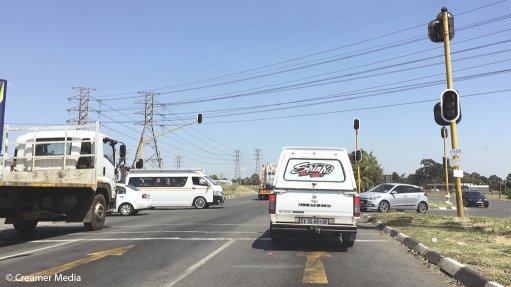
Photo by: Creamer Media's Donna Slater
The country’s traffic signals are currently in a dire state and various factors need to be considered to resolve the situation, Innovative Transport Solutions MD Jan Coetzee said during the South African Transport Conference, in Pretoria.
He pointed out that the operation or lack thereof of traffic signals was an indicator of the broader state of transport infrastructure, which is “woeful” and deteriorating.
Coetzee noted that many cities were experiencing similar challenges – the impact of loadshedding, vandalism and theft, and high operations and maintenance costs – that were affecting the operation of traffic lights.
He pointed out that, in some instances, it had become too costly to keep replacing the damaged or stolen traffic lights.
The lack of operational traffic signals, either as a result of power outages or vandalism and theft, was contributing to increased congestion on roads and freeways, with vehicles often caught up in long queues on freeway offramps and the freeways themselves.
Coetzee said solar-powered traffic signals are not a silver bullet solution, given that this infrastructure is also targeted by criminals, and that it is not always easy and feasible to install in areas that have a solid grid connection. Rather, it should be pursued where applicable, he noted, such as in rural areas without reliable grid connections, for example.
Another challenge is the lack of requisite skills at municipalities to design and maintain traffic lights.
Moreover, Coetzee said the country had unnecessarily high standards for its traffic signal designs. He said that while this was initially undertaken to engender safety, it now needed to be reconsidered, with a more appropriate approach being neccessary.
Meanwhile, there was also limited compliance by motorists and pedestrians with traffic signals, Coetzee pointed out.
He added that, at night, many motorists applied a ‘stop and go’ approach to traffic lights, given that they were at a high risk of being hijacked if they remained stationary at red traffic signals in certain areas. Coetzee emphasised that a solution was needed to ensure drivers were not in violation of the law but also not placing their lives at risk.
Coetzee pointed out that bus rapid transit signal heads had also been implemented in several areas, despite there being no buses running. This creates a further culture where traffic signals are ignored and/or disrespected by motorists, he pointed out.
Coetzee said funding of traffic signals was inadequate, with the money used, for example, for maintenance. He pointed out that private developers were required to build new traffic signals; however, the existing ones were not being maintained.